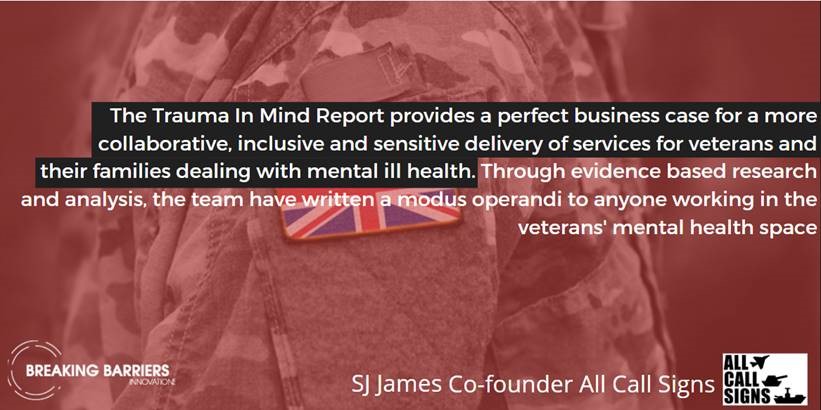Trauma in Mind
Addressing high intensity needs of veterans and family members affected by mental health-related trauma
Breaking Barriers Innovations and NHS Solent Trust launched a significant new report on veterans and their families, Trauma in Mind, at a webinar event on Tuesday 20th October 2020.
Our understanding of trauma and the profound and lasting ways in which it can affect people’s lives is increasing, and there is growing awareness of the requirement to make services more responsive to the specific needs that traumatic experiences can create. These needs can be immediate, arising at the point of the trauma or they can manifest years later in unforeseen ways that can make the experience hard to comprehend for the individual, those close to them and amongst the professionals and services they turn to for help.
The unpredictability and seeming dislocation between cause and effect that is often associated with the experience of trauma can complicate and challenge our ability to respond effectively. And it is this challenge that is coming to the fore in the Armed Forces Covenant and our commitment to ensuring that those who serve in the armed forces, whether Regular or Reserve, those who have served in the past, and their families, should face no disadvantage compared to other citizens in the provision of services. For the majority of people who serve on the armed forces, the experience benefits their mental health and wellbeing and most veterans transition to civilian life successfully. But for some, mental health problems and the experience of trauma can be significant and greatly impairs their ability to thrive after leaving the armed forces. For this significant group we
must ensure that their needs are met.
NHS England and NHS Improvement has been at the forefront of driving service developments to meet these needs, in particular Transition, Intervention and Liaison Services (TILS) and Complex Treatment Services (CTS). But what is being recognised is that despite the tremendous improvements these services have made in the identification and treatment of mental health related problems amongst veterans and their family members, there are some who require a much higher intensity service response. What is revealed by the needs assessment, in particular the lived experience of trauma that has informed this report, is that we need a more nuanced and comprehensive understanding of the full range of needs that can arise from the experience of trauma and the many emotional and social impacts that follow, not only for veterans but most
importantly for the family.
Alongside TILS and CTS NHS England and NHS Improvement are developing High Intensity Services (HIS), and we need to ensure that these vital services come together as part of an integrated care pathway that can meet the biological, psychological and social impacts of trauma related mental health problems. In this way, we will not only meet the commitment of the Armed Forces Covenant we will go beyond it: so that every veteran or family member who requires help receives it, in the right way, at the right time, every time. That is the aspiration of this report and while it is primarily focused on meeting the high intensity needs that arise from trauma related mental health problems, it also seeks to address the underlying causes of these needs. Because prevention must always be our first goal, and we can only achieve it by increasing our understanding and awareness, especially from the first-hand knowledge and lived experience of those who are the intended beneficiaries, the veterans and family members themselves.
Videos from the Event
The below videos are recordings from the webinar and feature Dr Mahdi Ghomi, Clinical Director of NHS Solent Trust, talking about clinical approaches to veterans’ mental health; SJ James, Co-Founder of All Call Signs; and the Q&A session that took place afterwards.
Event Interviews
You can watch recordings of our pre-event interview with Dr Mahdi Ghomi and post-event interview with David Noyes, Chief Operating Officer at Solent NHS Trust, below:








